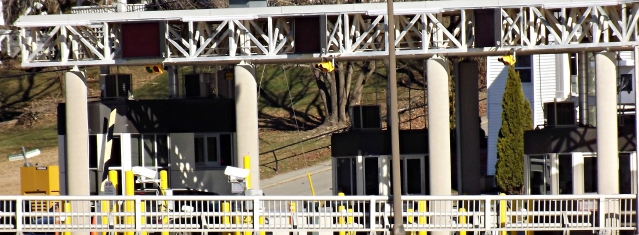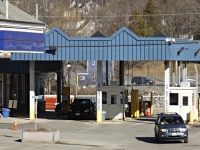Travel
Canada-US Border Closing
To Non-Essential And Tourist Traffic

Canadian Border, St Stephen New Brunswick (Source: Brian Teepell Photography)
USPA NEWS -
As of March 21st, there is a total of 1329 Covid 19 cases in Canada. It breaks down as follows: 424 cases in British Columbia, 226 cases in Alberta, 44 cases in Saskatchewan, 18 cases in Manitoba, 377 cases in Ontario, 181 cases in Quebec, 17 cases in New Brunswick, 2 cases in Prince Edward Island, 21 cases in Nova Scotia and 6 cases in Newfoundland.
On March 19th, Canadian Prime Minister Justin Trudeau, announced the Canadian-US border will be closing it's door to non-essential and recreational traffic by this coming weekend. Trudeau said, "We are continuing to work on the fine tuning of the agreement between Canada, the United States. I think it's almost there. My understanding is that the measures will probably come into place in the night between Friday and Saturday, so in about a day and a half."
Both Prime Minister Trudeau and US President Donald Trump have said that any border restrictions will NOT affect commerce and transport trucks will be allowed to cross the border in both directions to ensure that the flow of goods continue to arrive in both countries. As this is a developing situation we will continue to provide updates as they become available.
Over the last few days, Prime Minister Trudeau has strenuously urged Canadians to heed the warnings and self isolate and practice social distancing measures in order to do our part to slow down and prevent the spreading of the Covid 19 Virus. Trudeau has indicated that there are more measures still on the table, but did not mention any specifics. He was asked if the government is contemplating limiting travel within the country and he said, "His government is looking at all options. We will continue to look at all measures as they become necessary." Trudeau went onto say," invoking the Emergencies Act would be a significant step. Not a step that we feel we need today, but not one we are closing the door to in the future if necessary."
Every jurisdiction in Canada is feeling the impact of measures being implemented by Federal, Provincial and Municipal Governments. There have been cuts made to air, rail and public transit along with a ban on cruise ships. Non essential businesses and services have been cut back or closes. Retail stores have cut back hours or closed entirely. Federal and Provincial Government offices closed and encouraging people to rely entirely on web based services. Restaurants and coffee shops are closed for dining in services and are offering drive through service only. Schools, universities and churches are closed, while nursing homes and hospitals are closed to visitors. At this time, banks, gas stations, pharmacies, grocery stores and emergency rooms all remain open. Social distancing and self isolation procedures are in place along with a limit to the size of social gatherings.
BREAKING NEWS UPDATE
During the Friday, March 20th, press conference, the timeline for the closure of the Canada-US border was confirmed. Trudeau said, "The Canada-US border will close to non-essential travel as of midnight Friday. That means, come Saturday, tourists and visitors will not be allowed in. Canadian and American citizens and permanent residents who are currently visiting each other´s country can still return home. With COVID-19 continuing to spread, the health and safety of Canadians is our top priority. Canada and the United States have agreed to work together for the protection of our people and our economies. Together we will continue to work collaboratively and make the necessary sacrifices to fight this pandemic."
At 12:00 am Saturday, March 21st 2020, the Canada-US border closed to non-essential travel in both directions. More updates to follow when they become available.
Liability for this article lies with the author, who also holds the copyright. Editorial content from USPA may be quoted on other websites as long as the quote comprises no more than 5% of the entire text, is marked as such and the source is named (via hyperlink).






